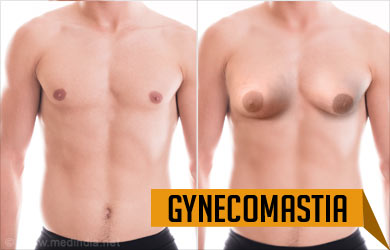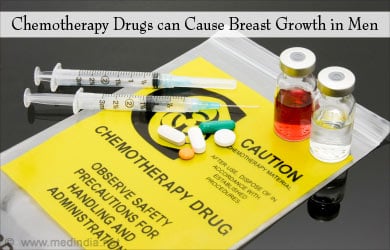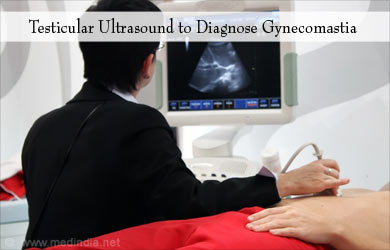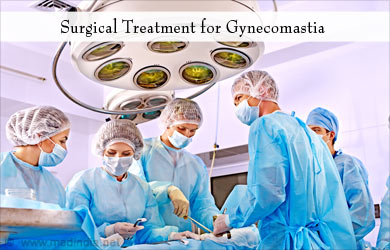- Gynecomastia - (https://en.wikipedia.org/wiki/gynecomastia)
- Gynecomastia – evaluation and current treatment options - (http://www.ncbi.nlm.nih.gov/pmc/articles/pmc3071351/)
- Enlarged breasts in men (gynecomastia) - (http://www.mayoclinic.org/diseases-conditions/gynecomastia/basics/prevention/con-20028710)
What is Gynecomastia?
Gynecomastia refers to enlargement of the male breast. In this disorder, glandular tissue of the breast becomes swollen and leads to the formation of the breast bud. It occurs primarily because of the excess of female hormone (estrogen) or due to lesser male hormone (testosterone) in the body.
The condition can affect newborns, teenage boys and older men as well, mainly due to changes in hormonal levels; however other causes may also be present.

What Causes Gynecomastia?
Hormonal changes in different age groups, for example:
In Newborns: The disorder is due to estrogen that enters the fetal circulation from the mother.
In Teenage Boys: The disorder is due to hormonal changes during puberty.
In Older Males: The disorder usually occurs due to reduced testosterone levels.
Intake of certain medicines like:
- Steroids like prednisone or dexamethasone
- Medicines (like cimetidine) for treating stomach ulcers
- Anti-epileptic medications like phenytoin
- Heart medicines like digoxin, calcium channel blockers and digitalis
- Chemotherapy drugs used in cancer treatment

- Anti-androgen drugs like flutamide, cyproterone and spironolactone
- Antianxiety and antidepressant medicines like diazepam and tricyclic antidepressants
- Certain antibiotics
- Intake of certain substances like: Alcohol, marijuana, methamphetamine, methadone and heroin
Health conditions like:
- Hypogonadism
- Tumors
- Hyperthyroidism
- Kidney failure
- Liver failure and cirrhosis
- Malnutrition and starvation
- Use of health products such as plant oils (like tea tree or lavender) used in shampoos, soaps or lotions
What are the Symptoms and Signs of Gynecomastia?
Gynecomastia causes enlarged breasts which may feel firm and rubbery. The breast bud may be present on one or both sides in boys. These breast buds are commonly seen in adolescent boys during puberty, which may last up to 2 years, but generally tend to go away in the first year.
Anxiety or stress due to a concern of having breast cancer, or due to the appearance of the chest.
Asymmetry of the chest and increase in diameter of the areola.

How is Gynecomastia Diagnosed?
- Initial diagnosis can be made by:
- Taking medical and drug history
- Doing physical examination
- Tests for determining the cause are:
- Blood tests for hormonal, liver and kidney disorders
- Mammograms, which can detect if the mass is benign or malignant
Further tests depending on initial results are:
- Computerized tomography (CT) scans
- Magnetic resonance imaging (MRI) scans
- Ultrasound of Testis

Biopsy of tissue (in the case of an unusually large lump in the breast, which may be tender, on one side, hard or fixed). Masses that are not located under the nipple should be evaluated for male breast cancer.
How is Gynecomastia Treated?
Mild cases in adolescence can be treated by altering lifestyle habits like proper diet and exercise. Periodic re-evaluations may be needed every 3 to 6 months to check for improvement.
Any underlying cause should be treated. Medications suspected of causing the condition should be stopped or changed on the advice of the prescribing physician.
More severe cases may require medications or surgical intervention.

Medications: These are effective in initial two years after beginning of enlargement of male breasts. Some medications, which have been tried out in gynecomastia but have not been confirmed to be useful include the following:
- Selective estrogen receptor modulators (SERMs) like tamoxifen or raloxifene; however, they are not FDA approved for the purpose.
- The estrogen antagonist clomiphene citrate.
- Aromatase inhibitors like anastrazole, which reduces estrogen production.
- The weak androgen danazol.
Surgery:
If the patient continues to have significantly enlarged breasts after initial treatment or observation, surgery may be recommended. There are two surgery options:
Liposuction: This method involves removing the breast fat and not the breast gland tissue
Mastectomy: This method is performed to remove breast gland tissue
Prevention of Gynecomastia
To reduce the risk of development of gynecomastia:
- Refrain from using illegal drugs like steroids and androgens, marijuana, heroin and amphetamines
- Restrict alcohol

- Review medications periodically and change if known to cause gynecomastia
Health Tips
- Avoid using illegal drugs like steroids, androgens, amphetamines, heroin, and marijuana
- Refrain from alcohol
- Check your medications regularly
- Get counseling to avoid anxiety and depression
- Reach out to family and friends who care about you and explain your situation
- Connect with others on the internet with similar condition





